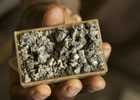
“The will and the capacity of the United Nations and Member States to deal with natural resource-fuelled conflicts is weak.” This is the opening sentence to a new report released by Global Witness detailing the challenges posed by resource-fueled conflicts to the United Nation’s peace efforts around the world. With case studies of Angola, Cambodia, Congo, Liberia, Sierra Leone, and Sudan, the report is a commendable effort to compare and contrast international efforts in a range of settings where natural resources can make the difference between war and peace.
The ongoing crisis in eastern Congo, a war fueled by the international trade in conflict minerals is a strong focus of the report. The failings of the U.N. and Member States in creating a “coherent and committed international approach” to conflicts such as that in the Congo are highlighted throughout the report. But, with each page turn, there is new reason to believe the international community can do far more to address one of the world’s deadliest conflicts. Specifically, Global Witness states that “de-linking armed violence and natural resource exploitation is critical to resolving conflict and re-launching development and democracy,” given the following two conclusions reached by academics and policy experts:
1. The governance of natural resources, who accesses them and why is the primary problem with such resources.
2. Economic activity, particularly when connected to natural resources, can be a driver of conflict.
The broad range of recommendations cover virtually every aspect of U.N. and Member States’ involvement in natural resource-driven conflicts, spanning from enhancing the role of peacemakers, peacekeepers, and peacebuilders, to strengthening U.N. initiatives such as by creating a high level panel to address self-financing wars, to enhancing Member State support of pre-existing operations in countries like Congo. The focus on the role of sanctions, and the role of the private sector in funneling conflict minerals into the global economy, illustrates the vital importance of initiatives such as the Conflict Minerals Trade Act.
The conclusion of the Global Witness report highlights the critical need for more vigorous involvement by the international community in resolving the conflict in Congo:
Many years after the U.N. first began to recognize the links between natural resources and conflict, international capacity to deal with them remains weak and fragmented. There is no more troubling illustration of these weaknesses than the collective failure to deal with the role of the international minerals trade in stoking an incredibly violent war in the Congo. In short, lessons have not been learned.
Photo: Tin ore mined in eastern Congo (Grassroots Reconciliation Group/Sasha Lezhnev)

